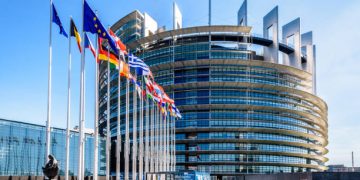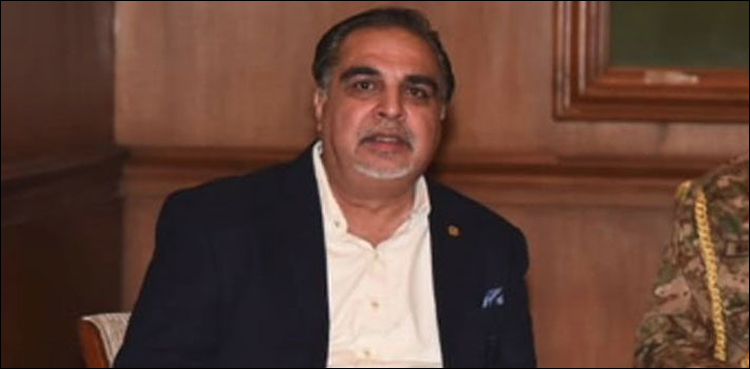Aizbah Khan
Federal Minister for Industries and Production Hamad Azhar presented the federal budget for the financial year 2020-2021 in the National Assembly.
The total volume of the budget for the next financial year is Rs. 71.37 trillion in which the government revenue is estimated by the Federal Board of Revenue (FBR) to be Rs. 4963 billion in terms of revenue and Rs. 1610 billion in terms of non-tax revenue.
According to the budget document, under the National Financial Commission, the federation will pay Rs 2874 billion to the provinces, while the net revenue of the federation for the next financial year is estimated at Rs 3700 billion and the total federal expenditure is estimated at Rs 7137 billion.
According to this calculation, the budget for the next financial year has a deficit of Rs. 3437 billion, which is 7% of the gross domestic product (GDP).
Salaries and Pensions of Government Employees
Federal Minister Hamad Azhar did not mention any increase in salaries and pensions of government employees during his budget speech. The Coronavirus has led to a huge increase in government spending and in this context it was expected that salaries and pensions would not be increased.
12.89 Trillion Allocated For Defense Sector
Federal Minister Hamad Azhar said that Rs 12.89 trillion has been earmarked for the defence sector in the budget for the next financial year. The government is committed to the principles of austerity in these difficult times.
Note that last year’s defence budget was not increased and it was maintained at Rs 1150 billion. However, this year the defence budget has been increased by Rs 139 billion.
Education
The budget proposes to allocate a total of Rs 83.363 billion for education and services.
According to the budget document, a substantial amount has been allocated for the education sector for the next financial year and the amount allocated for the Higher Education Commission has been increased from Rs 59 billion to Rs 64 billion.
In addition, Rs 5 billion has been allocated for uniform curriculum, standardized examination system, establishment of smart schools, inclusion of madrassas in the national mainstream and other educational reforms. Besides, Rs 30 billion has been allocated for research, artificial intelligence, robotics, automation, space technology and other fields.
Health
It is proposed to allocate a total of Rs. 25.494 billion in the federal budget for the health sector out of which Rs. 20 billion has been allocated for capacity building of the health sector and manufacture of medical devices for the Coronavirus.
Construction Department
The government has provided Rs. 30 billion to the New Pakistan Housing Authority while Rs. 1.5 billion has been allocated for the construction of low-cost residential houses through the Karz Hasna scheme under the Akhuwat foundation.
Agriculture
A total of Rs. 13.696 billion has been allocated for agriculture, food, irrigation, forestry and fisheries.
The budget has earmarked Rs 10 billion for providing relief to the agricultural sector and eradicating locusts.
Government’s Goals for the financial year 2020-21
The government has set some targets for the financial year 2020-2021 which will be aimed to achieve.
1-Gross Domestic Product (GDP) growth rate will be increased from -0.5 to 2.1%
2. The current account deficit will be maintained at 4.4%.
3. Inflation will be reduced from 9.1% to 6.5%.
4. Foreign direct investment will be increased by 25%.
Federal Development Program
The volume of the national development budget for the next financial year has been allocated Rs. 1324 billion, Rs. 650 billion for the federation while Rs. 674 billion has been allocated for the development budget of the provinces.
The budget has allocated Rs 650 billion for the federal development program.
To avoid cost overruns of ongoing projects due to Coronavirus, 73% has been allocated for ongoing projects and 27% for new projects.
Special attention has also been paid to social sector projects and Rs 206 billion was set aside for these projects last year which has now been increased to Rs 249 billion.
National highways and railways
Rs 118 billion have been allocated for the completion of ongoing projects under the National Highway Authority, especially for the western route of CPEC.
Besides, Rs 24 billion has been earmarked for ML-1 and other projects of Railways while Rs 37 billion has been allocated for other communication projects.
The share of provinces in distributable revenue
According to the budget document, a total of Rs 2,874 billion is estimated to be transferred to the provinces next year. Out of the distributable revenue, Rs 1,439 billion is estimated to be given to Punjab.
Out of the distributable revenue, Sindh is estimated to be given Rs 742 billion, while Khyber Pakhtunkhwa is estimated to get Rs 478 billion and Balochistan Rs 265 billion.
Federal Minister for Industries and Production Hamad Azhar in his budget speech said that Rs 100 billion was allocated for the Federal Board of Revenue (FBR) this financial year.
Special relief packages and other development projects
Hamad Azhar said that relief was given to the construction sector for the betterment of the economy, special relief was also given by the SBP to offset the ill effects of the lockdown, the SBP gave Rs 800 billion to the banks for individual loans with no side grant.
Hamad Azhar said that special budget has been embarked for FATA and Gilgit-Baltistan.
72 billion has been allocated for Azad Jammu and Kashmir, 32 billion for Gilgit-Baltistan, 56 billion for integrated districts in KPK, 19 billion for Sindh and 10 billion for Balochistan.
He said that Billion Tree Tsunami and New Pakistan Housing Scheme were also taking on in the budget.
Hamad Azhar said that non-tax revenue is expected to increase in the next financial year, Ehsaas program has been increased from 187 to 208 billion, and 180 billion has been allocated for subsidies in other sectors including energy and food.
Rs. 40 billion has been allocated for railways to provide affordable transport to the people.
Hamad Azhar said that Rs. 650 billion is being allocated for Public Sector Development Program (PSDP) and financial resources are also being provided for Diamer Bhasha, Mohmand and Dasu Dams.
Budget 2020-21 and Coronavirus
Hamad Azhar said that a package of more than Rs. 1200 billion has been approved for the eradication of Coronavirus. In total, Rs. 875 billion has been embarked in the federal budget for Coronavirus, Rs. 71 billion for purchase of medical equipment and Rs. 150 billion assistance for poor families.
The Federal Minister said that Rs. 100 billion has been embarked for the emergency fund and Rs. 70 billion has been allocated for the special development budget to contain the Coronavirus pandemic situation.
Hamad Azhar said that Rs. 2 billion has been allocated for the Kamyab Jawan programme, more than Rs. 1 billion has been allocated for the Ministry of Information Technology’s prepared plan through e-governance.
Protection funds for Artists
The Artist Protection Fund has been increased from Rs 250 million to Rs 1 billion for financial assistance to artists.
Condition of Showing Identity card whilst shopping
Now the condition of showing identity card will be applicable on purchase of one lakh not 50 thousand.
Hamad Azhar said that the requirement for submission of National Identity Card has been increased from Rs 50,000 to Rs 100,000.
Taxes
The tax rate on imported cigarettes has been increased from 65% to 100%.
Hamad Azhar said that the tax rate on caffeinated beverages has been increased from 13 to 25 percent and the tax rate on double cabin vehicles has also been increased.
According to the Federal Minister, the manufacture of mobile phones has been allowed in Pakistan. The sales tax rate for making mobile phones in Pakistan is being reduced.
Individuals who are not on the active taxpayer list will be charged 100 per cent more tax on school fees above Rs 2 lakh per annum. Taxes on educational institutions and marriage halls are being reduced.
Hamad Azhar said that an app has been introduced for the salaried class to pay taxes.
Coronavirus has upset the hotel industry, so it is proposed to reduce the minimum tax rate on the industry from 1.5 to 0.5 percent for six months from April to September.
The target for tax revenue in FY20 was Rs 5,503 billion but Rs 4,801 billion was collected due to Coronavirus.
The Coronavirus has reduced the FBR’s tax target to Rs 3,900 billion.
It is proposed to exempt more than 1600 tariff lines containing raw materials from customs duty. These items include raw materials used in chemicals, leather, textiles, rubber, and fertilizers. These tariff lines include about 200,000 items, which is 20% of total imports.
To encourage the local engineering sector, it is proposed to reduce the regulatory duty on hot rolled coils from 12.5% to 6%.
It is proposed to abolish all taxes and duties on coronavirus and cancer diagnostic kits, as well as exempt special food supplements and diet from all duties and taxes on all imported solutions to reduce their cost.
Decrease in powers of customs authority
It is also suggested that the powers of the Customs Authority be reduced to make smuggling penalties more practical so that the customs authorities do not voluntarily release any person involved in smuggling. Incorporate the principle of advance rolling in customs laws is also suggested.
Reduction in import tax
The income tax rate on imports is being reduced from 5.5 per cent on raw materials to 2 per cent and on machinery from 5.5 per cent to 1 per cent.
Tax relief on sale of immovable property
The budget proposes tax relief on income from the sale of immovable property. In this regard, the period of capital gain tax is being reduced from 8 years to 4 years while the amount of capital gain will also be reduced by 25% every year. At the same time, the tax rate on capital gains is being reduced by 50%.
Advance tax on motorcycles up to 200 cc abolished
Hamad Azhar said that advance tax on auto rickshaws, motorcycle rickshaws and motorcycles up to 200 cc has been abolished.
Federal Minister Hamad Azhar’s budget speech consisted of 1 hour and 5 minutes, after which the National Assembly session was adjourned till 4 pm on Monday.










































